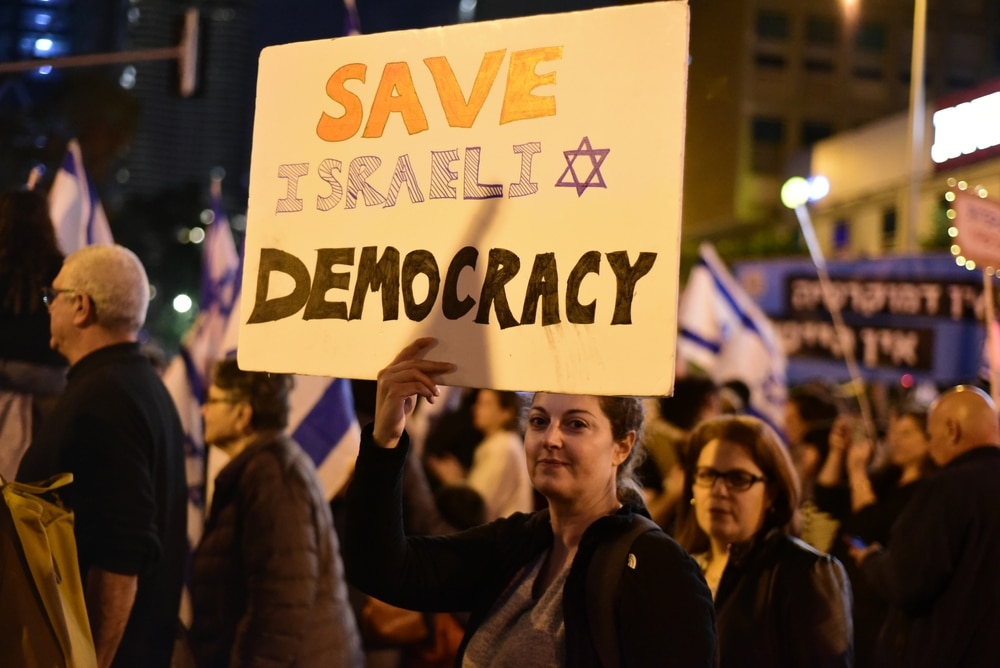A wave of protest, sparked by the Israeli government’s proposed judicial reform, shows no sign of ebbing as it crashes into its 30th Saturday in succession. Local news sources indicate that dissent will echo across 150 distinct locations within the country. A major congregation of dissenters is expected to coalesce on Kaplan Street in Tel Aviv in the evening.
“As we cross the threshold into this week, Israel is being steered into unfamiliar territory. The helm of the government seems hell-bent on wresting control of the Supreme Court, striving to forge Israel into a state under a singular command,” conveyed the coordinators of the demonstrations. “This audacious play has the potential to rattle our armed forces, disrupt societal harmony, and shake the pillars of our economic stability. Our resolve to amplify the outcry until democratic norms are reinstated in Israel remains steadfast and unwavering.
“In the aftermath of the bill green-lighted last Monday, the government appears to have mutated into an entity that frays the underpinnings of Israel’s traditional framework.”
In the run-up to the protest, “Kaplan Force,” the group at the helm of the protest, issued a statement. “The survival and stability of Israel, the robustness of its armed forces, and the resilience of its economy now hang in the balance, held in the hands of the multitude who will raise their voices in protest. Israel’s trajectory mirrors the path taken by Hungary and Turkey, a path fraught with uncertainty. The grandstanding and theatrical dissent of Likud MKs is a mere spectacle, designed to shroud Netanyahu’s maneuvers to cement his political coup in a cloak of silence. However, silence is a luxury he will not be afforded – the unwavering citizens of Israel will resist this encroachment on their democracy.”
High-profile figures are anticipated to join the Kaplan Street demonstration, including Prof. Yaakov Frankel, the former Governor of the Bank of Israel. The ranks of the protesters will be swelled by representatives from diverse groups including the Brothers in Arms, the tech sector, and student activists.
In a symbolic act of defiance, a march will originate from the Lev Tel Aviv police station before culminating at the main assembly point at Kaplan, providing a poignant response to the recent heavy-handed police actions, as outlined by Maariv.
Rehovot’s Science Park intersection was barricaded as a multitude assembled to lend an ear to speakers such as Gal Cohen, the torchbearer of the Hi-tech workers’ protest, and Lihi Lapid, wife of the opposition leader, Yair Lapid.
Various junctions in northern Israel have already experienced a swell of dissent, with approximately 2,500 participants at Karkur junction, 2,000 at Nahalal junction, and a thousand at Gome junction, according to reports from Kan. Kabri junction observed a smaller cohort of roughly one hundred protesters, as mentioned in Walla’s report.
The ripple effect of these rallies is expected to touch every corner of the nation, extending to regions such as Haifa, Beersheba, Jerusalem, Kfar Saba, Rosh Pina, Herzliya, Modi’in, and more.
Potential traffic impediments due to protests With the stage set for the protests, disruptions in the regular ebb and flow of traffic are anticipated from around 5 p.m., with the maximum impact expected to be felt in Tel Aviv, as delineated by Maariv.
Kaplan Street, extending from Ibn Gvirol Street to Menachem Begin Street, will be off-limits for traffic in both directions. The intersection linking Kaplan and Menachem Begin Street will also be inaccessible from both the north and south.
The Gesher HaShalom ramps will be shut off from the north and south, effectively barring any traffic flow to Highway 20. The southern and western entries to the Yigal Alon intersection at HaShalom, as well as Aminadav Street, will be barricaded.
Authorities have issued advisories warning of possible traffic snarls in and around Tel Aviv due to these measures.
Editorial credit: Avivi Aharon / Shutterstock.com

